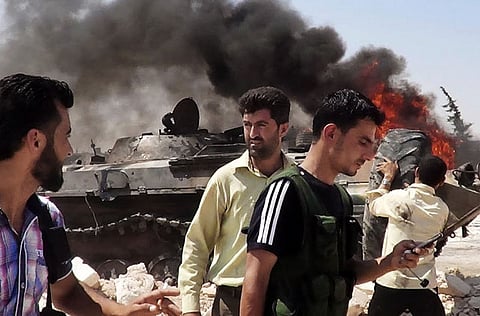Time for courage in Syria
Syrian opposition’s hour of reckoning

The bombing of the Syrian security headquarters last Wednesday might be an advanced effort by the Free Syrian Army in the fight to topple the regime, but it also shows a dangerous track Syria might be driven to.
The killing of four top security officials, who were running the war against the rebellious Syrian people, is a real blow to Bashar Al Assad, but it also shows a fundamental fact lost in the noise of propaganda, giving a clear answer about the nature of this regime. While lots of people (both anti and pro-Syrian regime) deal with the uprising as a battle between the Shiite Alawite minority and Sunni majority, the killed officials show that this is far from reality. The killed defence minister, Dawood Rajha, was a Christian and his successor is a Sunni. The former defence minister and the head of what is called “the crises cell”, Hassan Turkumani, was Sunni and the wounded Interior Minister is a Sunni also. Only Deputy Defence Minister, Assef Shawqat, is an Alawite.
This might provide an answer for the nature of the ruling Baath party and the power structure in Syria. Somehow, it is similar to the one that existed in Iraq under the stronghold of Baath party, before the invasion of 2003. Its secular nature combines people from different sects with a minority close circle holding power. Stereotyping the whole struggle of the Syrian people as just a battle between Alawites and the Sunni majority is not only wrong, but raises real concern about how the rebels can avoid any type of civil war after the collapse of the regime. Although the Syrian opposition adopted on July 3 a roadmap that emphasizes national unity in the transitional period after toppling the regime, they need extra efforts to avoid revenge at any level against the Alawite minority.
Furthermore, fears over the unity of Syrian army are becoming greater as the fighting and defection by troops continue. It’s quite well-known that in civil wars, any army have a capacity of repression. In the Syrian conflict, it is obvious that the Syrian state army has reached dangerous levels that threaten its unity as defections continue.
This raises real concern about the ability of this army in addressing any Israeli attempt to interfere in Syria under any alibi. It was a big mistake to ignore Israeli intentions from the beginning and Israeli Defence Minister, Ehud Barak, made it so clear when he announced last Thursday that Israel would intervene in Syria to prevent any possible shifting of missiles from the Syrian arsenal to Hezbollah. This might be just an alibi for Israel to intervene in Syria because Israel cannot stay on the seats of spectators for too long. Sooner or later they will interfere.
Israelis, like other international and regional players, can read the developments in the breathtaking situation in Syria very well. They know that the counting down to the end is accelerating and within this conflict of interests over Syria, Israelis have enough motives to act faster than others. While the French Foreign Minister on Saturday called on the Syrian opposition to unite and to organise itself to take over power, maybe it is time for Russia, in particular, to think about a new solution in Syria. They are now the most Influential player in this conflict and the door is still open for them to do so. Regardless of the veto and the support they showed for Al Assad’s regime, Syrian opposition can still be able to reach at a solid agreement with Russia and can assure Russian interests in Syria. The Russian military base in Tartous will not harm Syrian sovereignty and from a strategic point of view, it might be a necessity for Syria. That’s the only way to accelerate the end of the regime and avoid more bloodshed in Syria. Such a solution needs a brave move from the opposition, away from any kind of pressure from any regional or international player.
The last few months of the Syrian uprising have clearly shown how militarisation has pushed the civil uprising behind and raised deep concerns over the future. But in front of the brutality of the regime, no one would argue about the necessity of avoiding military means as the regime was pushing Syrians from the beginning to that choice. But this is exactly what raises fears of a possible conflict later between those who carried arms and the civilian leaders of this uprising, inside and outside Syria. Syrian opposition has to address all these concerns courageously.
Mohammad Fadhel is a Bahraini writer and media consultant based in Dubai.
Sign up for the Daily Briefing
Get the latest news and updates straight to your inbox



